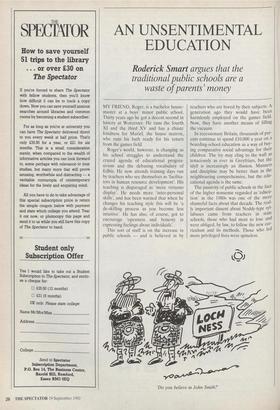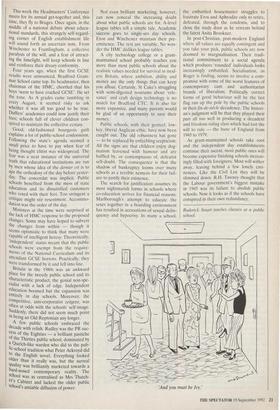AN UNSENTIMENTAL EDUCATION
Roderick Smart argues that the
traditional public schools are a waste of parents' money
MY FRIEND, Roger, is a bachelor house- master at a boys' minor public school. Thirty years ago he got a decent second in history at Worcester. He runs the fourth XI and the third XV and has a chaste fondness for Muriel, the house matron, who runs his bath ready for his return from the games field.
Roger's world, however, is changing as his school struggles to understand the crazed agenda of educational progres- sivism and the debasing vocabulary of Edbiz. He now attends training days run by teachers who see themselves as 'facilita- tors in human resource development'. His teaching is disparaged as 'mere virtuoso display'. He needs more 'inter-personal skills', and has been warned that when he changes his teaching style this will be 'a de-skilling process as you become less intuitive'. He has also, of course, got to encourage 'openness and honesty in expressing feelings about individuals'.
This sort of stuff is on the increase in public schools — and is believed in by teachers who are bored by their subjects. A generation ago they would have been harmlessly employed on the games field. Now, they have another means of filling the vacuum.
In recessionary Britain, thousands of par- ents continue to spend £10,000 a year on a boarding-school education as a way of buy- ing comparative social advantage for their children. The ivy may cling to the wall as tenaciously as ever in Greyfriars, but the idyll is increasingly an illusion. Manners and discipline may be better than in the neighbouring comprehensive, but the edu- cational agenda is the same.
The passivity of public schools in the face of the higher nonsense regarded as 'educa- tion' in the 1980s was one of the more shameful facts about that decade. The real- ly important dissent about Noddy-type syl- labuses came from teachers in state schools, those who had most to lose and were obliged, by law, to follow the new cur- riculum and its methods. Those who led more privileged lives were spineless.
'Do you believe in John Smith?' This week the Headmasters' Conference meets for its annual get-together and, this time, they fly to Bruges. Once again, in the middle of a national debate about educa- tional standards, this strangely self-regard- ing corner of English establishment life will sound forth an uncertain note. From Winchester to Framlingham, a collective paralysis of the will, and a fear of attract- ing the limelight, will keep schools in line and reinforce their dreary conformity.
Four years ago, when the first GCSE results were announced, Bradford Gram- mar School came top. Its headmaster, then chairman of the HMC, chortled 'that his boys 'seem to have cracked GCSE'. He set the tone. As A grades came tumbling in every August, it seemed risky to ask' whether it was all too good to be true. Duffers' academies could now justify their fees; schools full of clever children con- spired to maintain the collective ecstasy.
Good, old-fashioned bourgeois guilt explains a lot of public-school conformism. Following the state's agenda seemed a small price to have to pay when fear of being thought elitist was widespread. The fear was a neat instance of the universal truth that educational institutions are run by men whose idea of the demier cri is to ape the orthodoxy of the day before yester- day. The concordat was implicit. Public schools benefited from the mess of state education and its dissatisfied customers who voted with their feet. Too stringent a critique might stir resentment. Accommo- dation was the order of the day.
Ministers at the time were surprised at the lack of HMC response to the proposed changes. Some may have hoped to subvert the changes from within — though it seems optimistic to think that many were capable of intelligent heresy. Theoretically, 'independent' status meant that the public schools were exempt from the require- ments of the National Curriculum and its attendant GCSE horrors. Practically, they were transformed by it and fell into line.
Britain in the 1980s was an awkward Place for the tweedy public school and its characteristic product, the genial nonspe- cialist with a lack of edge. Independent education boomed but the expansion was entirely in day schools. Moreover, the Competitive, anti-corporatist zeitgeist, was often at odds with the schools' self-image. Suddenly, there did not seem much point in being an Old Reptonian any longer.
A few public schools embraced the decade with relish. Radley was the PR suc- cess of the Eighties — a brilliant pastiche
of the Thirties public school, dominated by a Ouelch-like warden who did to the pub-
lic-school tradition what Peter Ackroyd did to the English novel. Everything looked older than it really was, but the surreal quality was brilliantly marketed towards a hard-nosed contemporary reality. The school was as centralised as Mrs Thatch- er s Cabinet and lacked the older public school's amiable diffusion of power. Not even brilliant marketing, however, can now conceal the increasing doubt about what public schools are for. A-level league tables tell a simple tale. Academic success goes to single-sex day schools. Eton and Winchester maintain their pre- eminence. The rest are variable. No won- der the HMC dislikes league tables.
A city technology college or a grant- maintained school probably teaches you more than most public schools about the realistic values needed for survival in mod- ern Britain, where ambition, ability and money are the only things that can keep you afloat. Certainly, St Cake's struggling with semi-digested nostrums about 'rele- vance' and craft design technology is no match for Bradford CTC. It is also far more expensive, and many parents would be glad of an opportunity to save their money.
Public schools, with their genteel, low- key, liberal Anglican ethic, have now been caught out. The old robustness has gone — to be replaced by enfeebling scepticism. All the signs are that children enjoy dog- matism leavened with humour and are baffled by, or contemptuous of, defeatist self-doubt. The consequence is that the shadow of bankruptcy looms over many schools as a terrible nemesis for their fail- ure to justify their existence.
The search for justification assumes its most nightmarish forms in schools where co-education arrives for financial reasons. Marlborough's attempt to educate the sexes together in a boarding environment has resulted in accusations of sexual delin- quency and hypocrisy. In many a school, the embattled housemaster struggles to frustrate Eros and Aphrodite only to retire, defeated, through the condoms, and to close the study door as he retreats behind the latest Anita Brookner.
In post-Christian, post-modern England where all values are equally contingent and you take your pick, public schools are now doomed to marginalisation. Their tradi- tional commitment to a social agenda which produces 'rounded' individuals looks increasingly embattled. Socialisation, as Roger is finding, seems to involve a com- promise with some of the worst features of contemporary cant and authoritarian brands of liberalism. Politically correct forms of good behaviour will be the last flag run up the pole by the public schools in their fin-de-siecle decadence. The histori- an's judgment will be that they played their part all too well in producing a decadent and frivolous ruling class which had lost the will to rule — the bane of England from 1945 to 1979.
As grant-maintained schools take root and the independent day establishments continue their ascent, most public ones will become expensive finishing schools increas- ingly filled with foreigners. Most will wither away, leaving behind a few lonely emi- nences. Like the Civil List they will be slimmed down. R.H. Tawney thought that the Labour government's biggest mistake in 1945 was its failure to abolish public schools. Now it looks as if the schools have conspired in their own redundancy.
Roderick Smart teaches classics at a public school.
'And you must be Ivy.'



























































 Previous page
Previous page